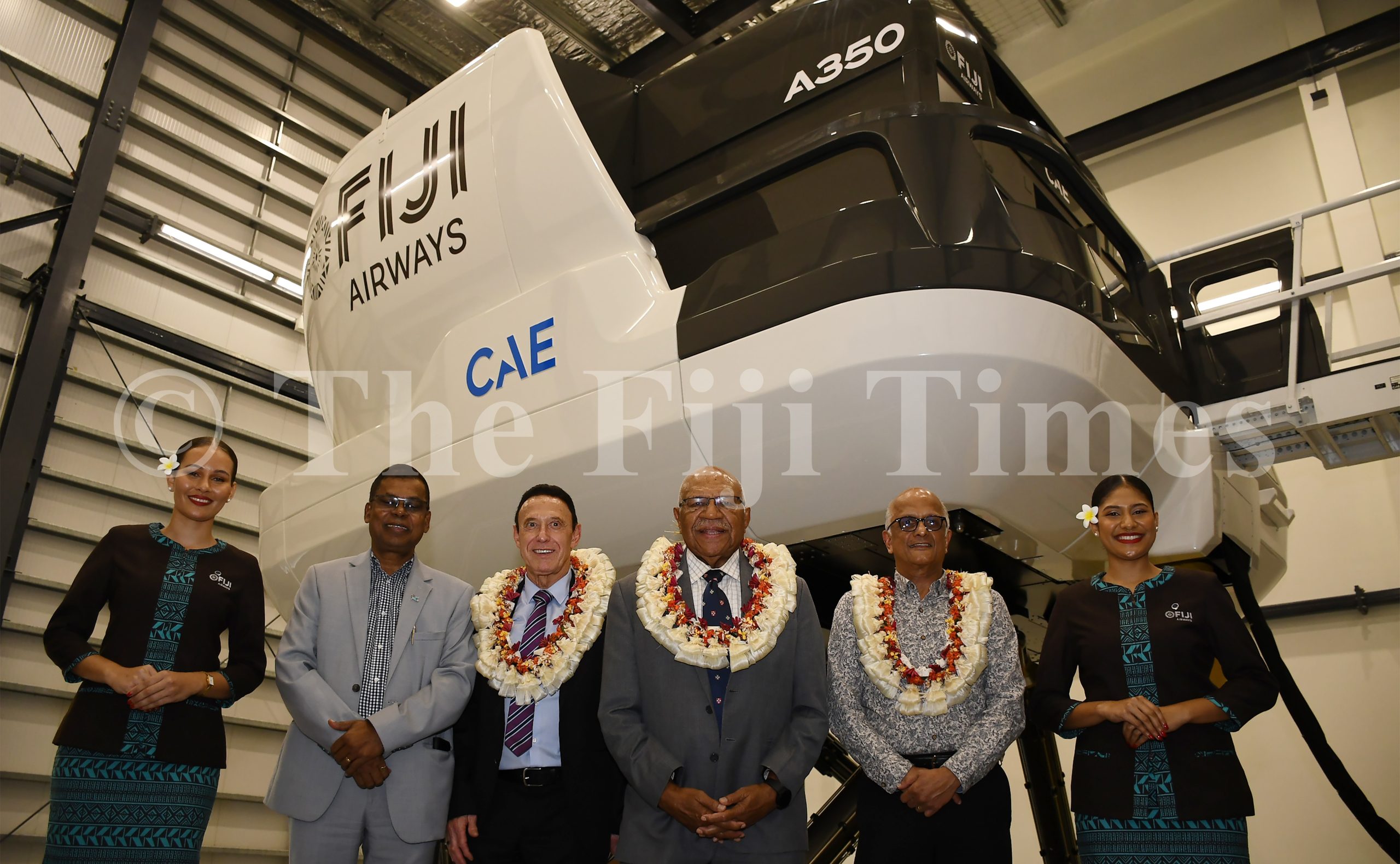FIJI Airways has announced yet another addition of cutting-edge technology to its aviation academy, with the official commissioning this week of two new CAE 7000XR full flight simulators for the Airbus A350 and ATR-72 aircraft, and two new CAE 500XR Fixed Training Devices (FTD’s) for the Airbus A330 and Boeing 737-Max 8.
The state-of-the-art simulators have been successfully installed, commissioned, and certified by EASA (European Union Aviation Safety Agency) and CAAF (Civil Aviation Authority of Fiji), marking a significant milestone in the academy’s ongoing mission to deliver world-class training for pilots and engineers, Fiji Airways said in a statement.
Fiji Airways’ chief executive officer and managing director Andre Viljoen said the addition of the new full flight simulators was a significant step forward for the Fiji Airways Aviation Academy (FJAA).
“It highlights our dedication to providing the highest standards of training and safety for our pilots and engineers and reinforces our commitment to establishing Fiji as a regional leader in aviation excellence,” Mr Viljoen said during the commissioning ceremony on Tuesday.
“By bringing advanced training technology directly to Fiji, we ensure that our pilots and engineers have the tools they need to excel in their careers.”
In officiating at the commissioning, Prime Minister Sitiveni Rabuka said technological advancements like the new simulators are crucial in Fiji’s journey towards a more resilient and diversified economy.
“They ensure that Fiji remains competitive on the global stage, offering cutting-edge training solutions that meet International Civil Aviation Organisation standards.
“The increased training capabilities of the Aviation Academy will ensure that we maintain the highest standards of safety and service, which are crucial in enhancing the travel experience of our visitors.
“This, in turn, strengthens our tourism industry, bringing more revenue and opportunities to our shores,” Mr Rabuka said.
$160m investment
The addition of the new simulators is part of Fiji Airways’ ongoing investment in the academy.
Early in 2023, its board had approved an investment in four additional pilot training devices that was to double its then existing synthetic training device footprint.
This, Mr Viljoen said, included a total investment of approximately $160 million, made up of the original $85 million in Phase 1 and an additional $75 million in Phase 2a.
With this week’s inauguration the academy now houses four full flight simulators covering all of Fiji Airways’ fleet types and four fixed training devices (FTD’s), all “ready for training”.
“This development is a testament to our commitment to nurturing local talent and ensuring Fiji remains at the forefront of global aviation,” Mr Viljoen said.
Home-grown skills
Since it opened in December 2019, FJAA has achieved many milestones, among them, maintaining the currency of the airline’s national technical crew through the COVID period, facilitating the progression of 34 national pilots in seat positions, undertaking 45 Type Ratings for national pilots new to type, supporting 74 foreign license conversions, re-integrating 13 Fijian pilots returning from overseas employment, and providing the venue for training over 600 local cabin crew, Mr Viljoen said.
Not only has FJAA saved the airline millions of dollars annually in training costs for its pilots, it has become a training powerhouse of sorts, Fiji’s own homegrown skills incubator for the aviation sector, dedicated to “developing local talent and offering comprehensive training solutions”.
“The academy is equipped to handle a wide range of aviation training needs, including pilot, cabin crew, engineering, and safety training,” Mr Viljoen said.
“By bringing advanced training technology directly to Fiji, we enhance our ability to support local professionals and provide top-notch training without the need for extensive overseas travel.
“This approach allows our pilots and engineers to stay closer to their families while advancing their careers, reinforcing our commitment to their well-being and development.”
The two new machines will provide FJAA trainees “with the most advanced, realistic, and comprehensive training experience available, leveraging cutting-edge technology to simulate real-world flying conditions.”
Expansion plans
The national airline intends to maintain its investment beyond the current Phase 2a and develop FJAA “into the Pacific’s preferred destination for commercial aviation training.”
It sees the new addition as further solidifying FJAA’s position as a leading aviation training center in the Pacific.
“Our aim is to grow the academy on the firm foundation of Fiji Airways’ own training needs as the anchor customer, enabling it to compete for a share of the global airline training market and drive new ancillary revenue streams for the airline,” Mr Viljoen said.
“In addition to providing for Fiji Airways’ needs, the academy has extra capacity for sale to foreign third-party airlines.
“This third-party revenue will help sustainably reduce the operating costs of the academy.”
The plans also synchronise with Fiji’s own role in the Pacific, where it is perceived as a leader and trendsetter in regional affairs.
“Fiji Airways’ advancements are not just beneficial for our nation but also for our neighbours in the Pacific,” Mr Rabuka said.
“These new simulators will enhance regional connectivity, allowing us to better serve and support the economies of our fellow Pacific Island nations.
“This facility strengthens our role as a leader in regional aviation, bringing us closer together as a region.
“The Academy’s expanded capabilities will enable us to train pilots and engineers from across the Pacific, further solidifying Fiji’s position as a hub for aviation training.
“This is an opportunity to uplift the entire region by providing world-class training right here in the heart of the Pacific,” Mr Rabuka said.



